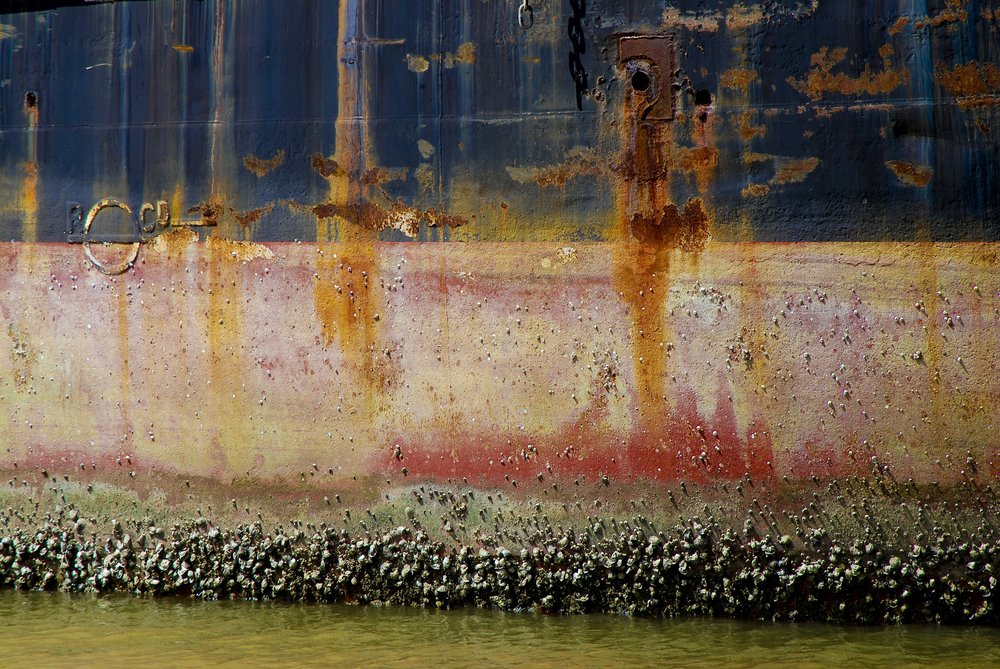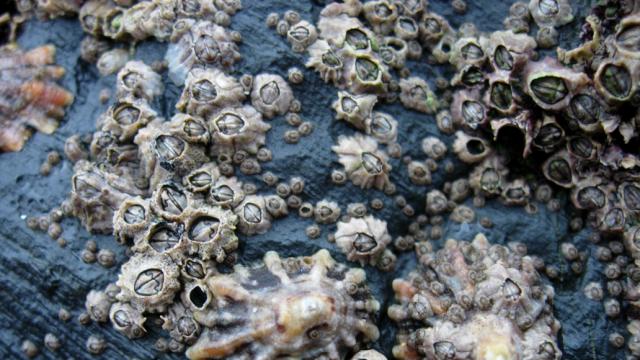It’s a problem as old as sailing itself. Ever since man set out sea, barnacles have been clinging like, well, barnacles to ships, growing into bumpy masses that slows down vessels and wastes fuel. Could the solution to this age-old dilemma be a new coat of special paint? It’s not as simple as it sounds.
A recent report touting the benefits of anti-barnacle paint got me wondering just how big a problem barnacles could possibly be. Turns out these tiny creatures can make a ship burn up to 40 per cent more fuel. Their collective mass is small compared to the overall ship, but their little bodies have an outsized effect creating drag around the ship’s otherwise smooth hull.
Biofouling is the technical name for the crusting of barnacles, mussels, and bacteria on ships. Barnacles, with their superstrong non-soluble glue, are the worst culprits. It’s all an especially big problem for the Navy, whose vessels are docked and stationary for much of the year. The US Navy spends an additional $US 500 million per year in fuel and maintenance costs thanks to biofouling. Now there are ready solutions to biofouling, but as you might expect, chemicals that kill barnacles aren’t so great for the ocean, either.

In the 18th century, the British navy began sheathing their ships in copper, which made the hulls immune to both barnacles and a particular hazard to wooden ships of the era, shipworms. Underwater, a toxic film forms on the copper, keeping away any marine life. “That was a radical technical advance,” biochemist Ben Van Mooy told Oceanus Magazine. “It was probably one of the things that contributed to the emergence of England as a naval superpower in the 18th century.” Perhaps you’ve heard the phrase “copper-bottomed” to describe an especially reliable thing.
Copper-sheathing came to an end though, because of steel. Navies shifted from wood to stronger steel ships, but the presence of copper causes steel to corrode faster. They could, however, still use copper-based paints. Other paints were also tried, using poisons such as arsenic, mercury, strychnine, cyanide and tin. “Tin was wonderful,” port engineer Dutch Wegman said. “But it’s a funeral of death — everywhere it went, it was killing off, to some extent, everything around it.” The tin-based tributyltin, for example, was banned after it killed off oyster farms in Europe.
That leaves us with trying to find more eco-friendly antifouling solutions. The Navy has announced plans for a Robotic Hull Bio-Mimetic Underwater Grooming system, or Hull BUG. “In some ways its mission is similar to a robotic home floor cleaner, lawn mower or some advanced pool cleaners in that it is designed to be tether free, autonomous and run on a battery for a significant duration of its mission,” says the Navy. It’s a four-wheeled underwater roomba for barnacles.
But a solution easier to implement will probably come from the realm of chemistry. Most recently, Argentinian scientists reported that chemicals isolated from the Maytenus tree could repel barnacles. That’s on the heels of many other supposedly environmentally-friendly antifouling coatings, inspired by everything from shark skin to bacteria to animal anesthetics. Whether any of these can tough it out at sea remains to be seen.
Barnacles are so small, it’s easy to overlook their outsized effect on ships all over the world. Consider the magnitude of the problem, and we can see the magnitude of benefits to a solution. What if we could save millions of gallons of fuel with a new ship paint? [Oceanus, American Chemical Society, Popular Science, The Guardian, Office of Naval Research]
Pictures: Mark Wilson/Wikimedia Commons, John de la Bastide/Shutterstock
